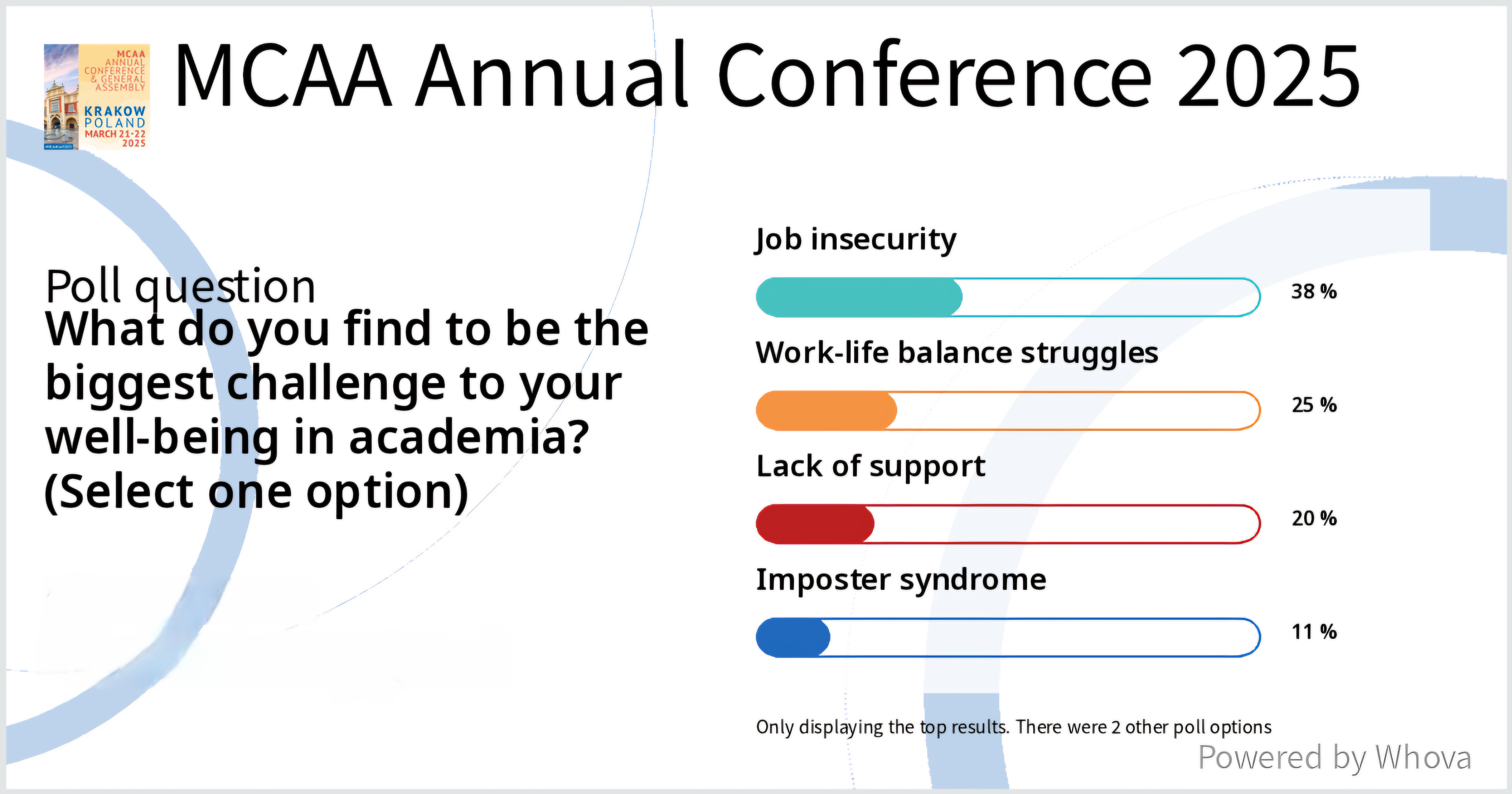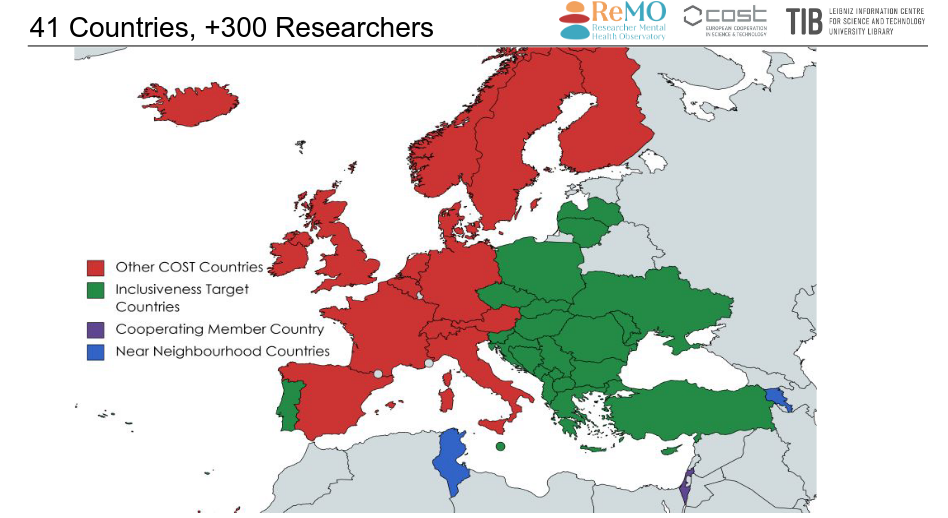MCAA Annual Conference 2025 - Impact on Researcher Wellbeing and Mental Health: Reflections from the MCAA
Newsletter
Doing research is intellectually rewarding, but it often comes with intense pressure and personal challenges. The “publish or perish” culture and institutional demands can take a serious toll on mental health. As highlighted by the presenters, beyond academic stress, the effects of an unsupportive environment are equally significant and must be acknowledged when addressing researcher wellbeing.
Why is everyone so stressed in research?
Mental health is still a taboo topic, although research shows that more than two in five students experience mental health issues during their PhD, with international students and women being at higher risk (Keloharju et al, 2024; Van Der Heijde et al, 2019). Certainly, personal traits, such as perfectionism and impostor syndrome, contribute to the deterioration of mental health, but this is not the whole picture (Berry et al, 2021). Many of us have seen bright young scholars start their PhDs with excitement, only to end up emotionally and mentally drained, struggling with feelings of inadequacy and burnout. At later stages, post-doctoral careers can bring a new set of challenges, often accompanied by a strong sense of instability and frustration, which can impact mental well-being and influence career decisions. A key common factor underlying many of these experiences is the research environment. Researchers’ mental health is heavily shaped by this context, including the quality of supervision, lack of institutional support, job insecurity, mobility demands, and home-life circumstances (Kismihók et al., 2021). Poll results from the session attendees reflect these findings, with most identifying their biggest well-being challenges in academia as, in order: job insecurity, work-life balance struggles, and lack of support.
Academia said, “If you can’t measure it, it doesn’t exist”, and ReMO replied, “Well, not anymore.”
At the 12th Marie Curie Alumni Association (MCAA) Annual Conference, the session on mental health and wellbeing in academia drew significant interest. The discussion focused on the Researcher Mental Health Observatory (ReMO) COST action, which began with just 10 core researchers and grew to include more than 300 members. By the time the project concluded in September 2024, thousands of researchers had been involved, marking a major step forward in how mental health is understood and supported in the research community.
ReMO managed to involve researchers from around the world and engage with partners from universities, EU policymakers, Eurodoc and institutes. The initiative focused on gathering evidence around researchers’ wellbeing and its objectives were documented in the Researcher Mental Health and Wellbeing Manifesto (Kismihók et al, 2021). All ReMo’s outputs are freely accessible on Zenodo, including books, webinars on YouTube, training resources from the ReMO Ambassador program, podcasts sharing personal stories, and policy briefs.
A key highlight of this project was the launch of the STAIRCASE survey, a large-scale data collection effort focused on working conditions. Distributed across all member countries, the survey collected over 4.500 responses, making it one of the largest surveys on academic working conditions in Europe. The findings, which will be publicly available soon, will provide valuable insights into shaping the future of academic working conditions. One of the biggest ReMO achievements was the inclusion of the term “mental health” into the new European Union’s European Charter for Researchers.

Impact on Researcher Wellbeing and Mental Health: Reflections from the MCAA
What comes next?
The MCAA Genders, Equity, Diversity & Inclusion (GEDI) Working Group is launching on 11 April 2025 the Mental Health Task Force, a new initiative within the Marie Curie Alumni Association focused on supporting the wellbeing of its members. The task force aims to develop resources, promote open dialogue, and integrate mental health awareness into MCAA activities and policy positions. Their goals include organizing workshops, compiling a directory of professionals, developing guidelines, amplifying lived experiences, and collaborating with European networks like ReMO to ensure alignment with broader efforts. This task force reflects MCAA’s commitment to fostering a supportive, inclusive, and sustainable research culture for all its members.
Insights and lessons learned
While change is underway, it remains in its early stages. It is unacceptable that academia is eating its own children by often propagating bad practices with toxic mentalities like “I suffered, so you should too”. It is not helpful for the individuals, it is not assisting research progress, it costs money on the country's development and health care systems, and it is not productive for society as a whole. We need to do better. As the younger generation is more anxious but also more open to discussing mental health (Alison, 2024), institutions may finally be pressured to change practices and prioritize researchers' well-being. Till then, let’s advocate for mental health and raise awareness.

Source: ReMO’s Zenodo report: Evidence of change-making and the power of academic communities
Eleni Ilkou
MCAA Newsletter Editorial Board Member
Leibniz University Hannover
ilkou.el@gmail.com
References
Berry, C., Niven, J. E., & Hazell, C. M. (2021). Personal, social and relational predictors of UK postgraduate researcher mental health problems. BJPsych Open, 7(6), e205.
Alison M. (2024). How Gen Z is shaping a new era of mental-health care. Retrieved from
https://red.msudenver.edu/2024/how-gen-z-is-shaping-a-new-era-of-mental-health-care/
Kismihók, G., Cahill, B., Gauttier, S., Metcalfe, J., Mol, S. T., McCashin, D., … & Kling, C. (2021). Researcher mental health and well-being manifesto (Doctoral dissertation, Researcher Mental Health Observatory).
Kismihók, G., McCashin, D., Mol, S. T., & Cahill, B. (2022). The well-being and mental health of doctoral candidates. European Journal of Education, 57(3), 410-423.
Keloharju, M., Knüpfer, S., Müller, D., & Tåg, J. (2024). PhD studies hurt mental health, but less than previously feared. Research Policy, 53(8), 105078.
Van Der Heijde, C. M., Douwes, L., & Vonk, P. (2019). Mental health problems and support
needs of PhD students: bottlenecks of the phD trajectory. European Journal of Public Health,
29(Supplement_4), ckz186-588.